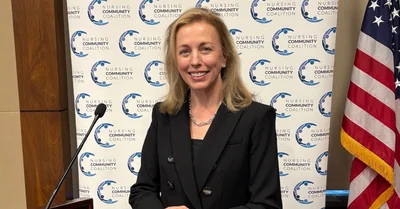A free and open Indo-Pacific region is a central objective of U.S. foreign policy, which is reflected in President Joe Biden’s Fiscal Year 2024 (FY24) budget which calls for major expenditures in the region.
The Senate Appropriations Committee on Tuesday heard why this is important during the hearing “Investing in U.S. Security, Competitiveness, and the Path Ahead for the U.S.-China Relationship,” as it pertains to FY24 spending. Witnesses at the hearing included Secretary of Defense Lloyd Austin III, Secretary of State Antony Blinken and Secretary of Commerce Gina Raimondo, the committee reports.
“We find ourselves at a real turning point,” Committee Chair Sen. Patty Murray (D-Wash.) said in her opening statement. “And this year’s government spending bills will determine whether or not we are prepared to compete with China and whether or not we will stay ahead or fall behind.”
Vice Chair Sen. Susan Collins (R-Maine) stated that America’s competition with the People’s Republic of China (PRC) is not a new challenge, and it requires a multi-faceted approach. One focal point is military deterrence but another area of concern is the fentanyl crisis, Collins stated, as China sends precursors for synthetic opioids to Mexico and elsewhere.
Witnesses at the hearing testified how their departments’ funding requests would help to achieve goals related to stability in the Indo-Pacific.
Defense Secretary Austin listed five objectives from a military standpoint, testifying that the U.S. must continue to outpace the PRC; federal agencies must work as a team; the U.S. is determined to keep Indo-Pacific free and open; the administration is working to deepen ties with the nation's network of alliances around the world; and the best way to ensure the U.S. advantage is with an on-time appropriation.
To compete and succeed, we must use all of the tools of American power, Austin stated.
Sec. of State Blinken, in making his budget pitch, agreed with Sen. Murray.
“To your point, Chair Murray, I think we do stand at an inflection point,” Blinken said in his testimony. “The Cold War is over. There is an intense competition underway to shape what comes next. China is the most consequential geopolitical challenge that we face today.”
With China’s intent and increasing capability to challenge the U.S. vision of a secure international order, the State Department’s goal is to make the U.S. the better partner of choice on the global front, and staying a step ahead of China is key to achieving that aim, Blinken stated.
Commerce Sec. Raimondo in her testimony stated she agreed that staying ahead of China globally requires a unified front, with all agencies operating in a “whole of government” approach. “It requires the full complement of economic, diplomatic, and military tools,” she said.
Commerce’s role centers on investing in manufacturing and supply chains, with the U.S. taking more of the responsibility for both, Raimondo said.
The FY24 budget plan aims to "sustain and strengthen deterrence" in the Indo-Pacific region by “prioritizing" China as "America's pacing challenge," in accordance with the National Defense Strategy, the document states.
The proposal allocates $400 million to the Countering PRC Influence Fund to bolster the U.S. position in strategic competition with China, and includes more than $2.3 billion in discretionary funding to support the State Department's goal of promoting safety and openness in the Indo-Pacific region. This budget supports an expansion of the U.S.'s diplomatic presence in the region, especially in the Pacific Islands, and supports the strengthening of relationships with allies, the document reports.
Murray requested the witnesses talk about the importance of operating on a budget rather than a continuing resolution, the threat of which is looming. All three witnesses agreed the funding impasses could erect a hurdle in the country’s battle to stay ahead of China.
Collins and Sen. Shelley Capito (R-W.V.) focused on fentanyl, asking for details on what the agencies are doing to halt China’s export of the precursors used in the manufacture of synthetic opioids. Much of that responsibility falls on the State Department, which is regularly talking with China about doing its part to prevent the manufacture of the deadly drug, according to Collins and Capito.
Sen. Jeanne Shaheen (D-N.H.) asked for an account of the stalling of the filling of ambassadorships, which is allowing China to increase its footprint in various African nations and elsewhere, Shaheen stated. Blinken said filling ambassador spots is one way to slow China’s influence in those regions.
One point of contention arose when Sen. Lindsey Graham (R-S.C.) took his turn asking questions. He drew a parallel between the Russia invasion of Ukraine and tensions between China and Taiwan, and asked Austin if he agreed that China will be more likely to invade Taiwan if Putin prevails in Ukraine. Graham asserted that spending money on "being nice" won’t stop China, but rather what matters is the U.S.'s willingness to stand up to the PRC. He stated he thinks defense spending is more important than diplomatic spending.
By focusing on diplomacy, “We’re sending another signal that we’re all talk when it comes to bad actors,” Graham said.
Graham allowed little time for response during his allotted time and left the hearing after his session, forcing Blinken and Raimondo to rebut Graham's claims during Sen. Chris Coons's (D-Del.) speaking time.
To send a message to the PRC, Congress needs to pass a robust, full-year appropriations bill, according to Murray and not focus solely on one department or policy.
“We have to be clear that tackling this challenge isn’t just about how much we spend on our military," Murray said, "because if we choose to only plus-up defense spending and undercut other critical programs across government, we are setting ourselves up to lose the 21st century to China.”
“We need to make sure that we invest in America across the board,” the senator said.









